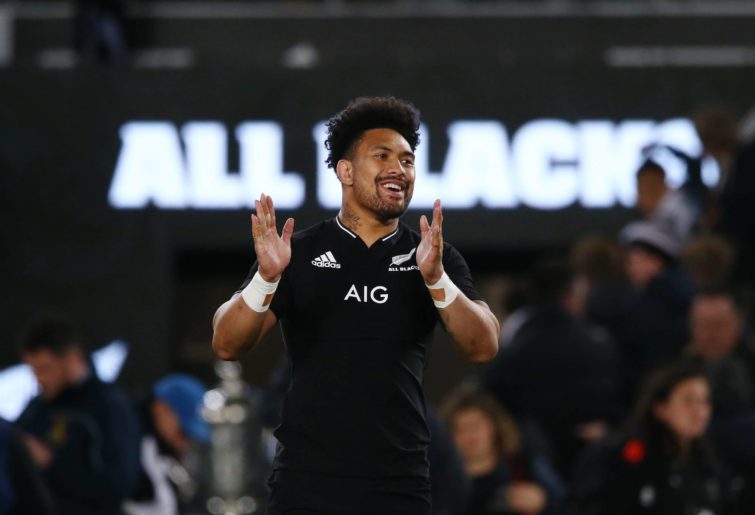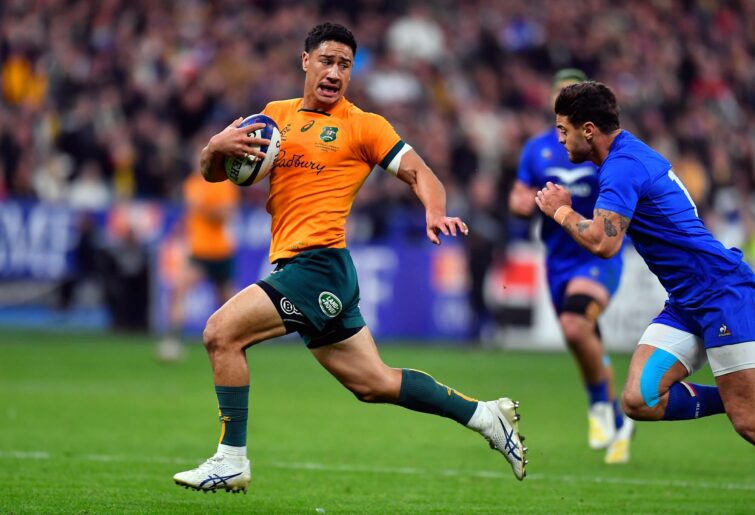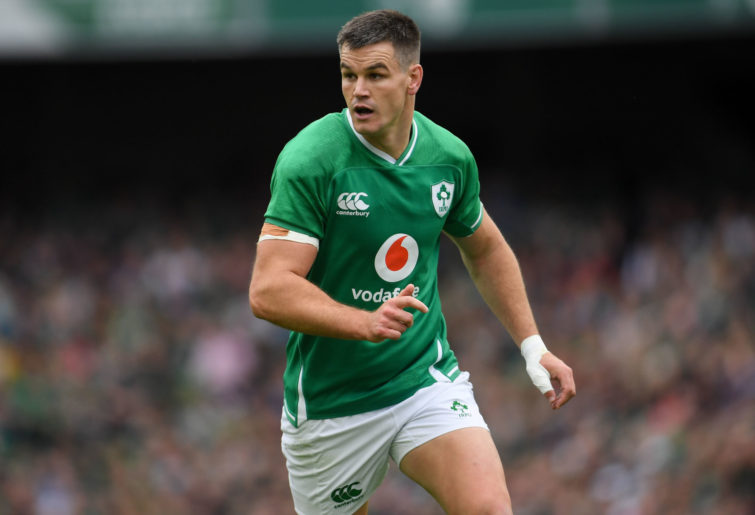After a wretched run, New Zealand’s year took a decided turn for the better, across what was a highly enjoyable, full-blown weekend of Test rugby.
The action started in Dublin, where a New Zealand XV comprehensively dealt to their Ireland A counterparts 47-19, demonstrating the benefit of blending experienced Test players like TJ Perenara, Patrick Tuipolotu and Damian McKenzie with emerging talent like Dom Gardiner and Ruben Love.
Like Australia’s obsession with finding the ‘next number 10’, New Zealand fans have, since the retirement of Jerome Kaino, longed for their ‘next number 6’. Far be it for this column to put the ‘kiss of death’ on the impressive Gardiner, but here were very promising signs.
This match was something of a throwback to times when New Zealand’s physicality, speed and skill execution was too much for all comers; a strategy that has served them less well in recent times, as the conditioning, coaching and skills gaps have been overcome.
The Roar rugby experts Brett McKay, Harry Jones and Jim Tucker come together for another Instant Reaction from the Wallabies’ Spring Tour of Europe, a heartbreaking 30-29 loss to France in Paris
With cohesion the buzzword of 2022, both sides were expected to struggle, having been thrown together on limited preparation. As it happened, that was true only of the home side, who looked callow and underdone by comparison to New Zealand.
The Women’s World Cup burst into life, with two wonderful semi-finals sealing the passage of England and New Zealand through to next weeks’ final.
Both losers can hold their heads high. Canada bravely stayed in contact throughout, but England – aided by a thrilling length of the field try to Abby Dow – professionally closed things out 26-19.
In the second match, France led for long periods, and were only a tugged penalty attempt from flyhalf Caroline Drouin, from stealing what would have been an epic victory.
Here was intensity and physicality writ large; Eden Park gripped with tension as France pressed late for the win. Players struggled to keep their heads; a prop kicking the ball away into touch with 90 seconds remaining, protecting a one-point lead, surely not in Wayne Smith’s playbook.
This tournament has been marked by a certain tactical naivety which, ironically, has contributed to its appeal; the game feeling fresher and purer than the men’s game. In both semis, all four sides seemed intent on crashing their way through the middle of the opposition, yet all four profited – and played their best rugby – when they moved the ball into space.
England are still favoured in next week’s final, but if New Zealand can find a way to defend their lineout maul, continue to create and run into space, and feed off what will be a vocal home crowd, they have more than a fluker’s chance.
As if stung by last week’s muddling performance in Tokyo, the All Blacks – admittedly with a significant personnel upgrade – hit upon the right tactics and intensity level to pound Wales into submission, 55-23 in Cardiff.
From the off there was no doubting the All Blacks’ purpose. Richie Mounga’s kicks had an extra 15 metres of carry on them, and there was no meddling about in midfield with a slippery ball, just a single-minded focus on punching holes and supporting the ball runner with deadly accurate work at the breakdown.
So convincing was the All Blacks’ clean-out, Wales’ emerging star flanker Tommy Reffell was obliterated as a presence, while not even the second half appearance of ‘Mr. Ageless’, Alun-Wyn Jones, could help stem the black tide.
Wales did manufacture two clever tries, and smart halfback Tomos Williams was a constant threat, but when you’re conceding eight scores at the other end, that’s not really here nor there.
One of those tries was to the irrepressible Ardie Savea – a clear stand-out for man of the match – which featured his now-familiar swan dive. Savea’s other trade-mark move, the exaggerated, telegraphed dummy that fools nobody, also provided a try to Aaron Smith; replacement prop Nicky Smith left red-faced as the only person in Principality Stadium who didn’t see it coming.

(Photo by Anthony Au-Yeung/Getty Images)
Smith’s superb first try demonstrated the value of a halfback focusing on his core distribution role, underplaying his hand, then, having conditioned the defence to follow the ball wider, choosing the right moment to run into the hole provided; reminiscent if you like of a bowler setting a batsman up for a dismissal in Test cricket.
While it was Savea, Smith and an improving Codie Taylor who stole the headlines, and Shannon Frizell laid his claim for a permanent spot at number 6, this performance again showed the value Sam Whitelock provides as the essential glue that binds this forward pack together. Even if Whitelock is only wearing the captain’s armband in Sam Cane’s absence, it is hard to escape the feeling that this is becoming his team.
After such a roller-coaster year, the task now for the All Blacks is simple; go to Murrayfield and Twickenham and put convincing, back-to-back performances together. If that can be achieved, then what looked like being the year from hell, will end up, if not quite the year from heaven, being something for the rest of the rugby world to chew over heading into a World Cup.
While France’s women suffered the agony of a one-point loss in Auckland, their men’s side had the coin flip their way in Paris, squeezing home 30-29 against a valiant, but ultimately self-destructing Wallabies.
In their first outing for the international season, Les Blues looked short of a run and struggled for cohesion for much of the match. But they are a more mature and ‘finished’ product than the Wallabies, proving the adage that good sides almost always find a way to eke out a win, even on an off day.
None of that is to disrespect the Wallabies, who started well, stayed in touch throughout, and had the game there for the taking, entering the final five minutes ahead by four points.
Most impressive was their maul defence and the repeat efforts of James Slipper, Michael Hooper, Rob Valetini and Will Skelton, after he came on, that matched whatever the much-vaunted French pack threw at them.
The Wallabies also escaped the shackles in the first half, going end-to-end for a wonderful, sweeping counter-attack try to Lalakai Foketi, that should have given them a half-time lead. But instead of closing out the half, they got caught playing too much rugby, Bernard Foley throwing a poor pass in midfield that led to a try to Julien Marchand on the turnover.

Lalakai Foketi of Australia (Photo by Aurelien Meunier/Getty Images)
On a weekend mercifully free of contentious refereeing decisions, Jaco Peyper was momentarily thrown into confusion, where replays to confirm grounding might have been better served reviewing a knock on back near half-way, in the gathering of Foley’s wayward ball.
Foley’s next scoring pass was much better; finding space for Jock Campbell to score his first Test try, but despite finding themselves in a winning position, familiar issues emerged that would conspire to see the Wallabies come up shy.
Recovering a charge-down in midfield, a panicked Valetini, instead of feeding an outside runner or charging over the gain line, inexplicably threw the ball onto his left foot, not only giving away possession, but putting the rest of his pack offside as a result.
Hodge restored the lead, but his exit kick was a shallow pop-up, inviting France back into the 22 to ice the game. They only needed one opportunity; Tom Wright and Campbell ruining otherwise good performances by letting Damian Penaud step through a couple of tackles they would dearly love to have again.
Now chasing a miracle, Folau Fainga’a threw too far down his own side of the line-out, and what could have been a defining moment for this side wafted away into the cool Paris evening.
With every pundit and fan chalking this match off as a loss for the Wallabies before the tour, a one-point defeat might be seen in some quarters as a surprise result; an honourable defeat, if you like.
It won’t feel like that for the Wallabies, and nor should it. Test rugby is played at the big boys table, and when you get an opportunity to win – no matter the opposition, no matter the location – any side worth its salt needs to step up and take it.
The trick now is for the team to bottle their frustration and turn this into a springboard for a convincing performance in Italy, next weekend.
The clash of the heavyweights, Ireland and South Africa in Dublin, was a gripping and tense affair throughout, with Ireland rewarded for playing marginally the more rugby, delighting their home crowd, with a 19-16 win.
The only slightly sour note for Ireland came with hooker Dan Sheehan’s attempt to win the Greg Dyer award, claiming a first-half try that he must have known he didn’t score.
More convincing was Josh Van der Flier’s effort to ground the ball in the corner despite all players in the line-out maul thundering over the sideline towards row one of the Aviva Stadium.
Watchers new to rugby might reasonably have asked why the world’s two top-ranked sides could be so deficient in the art of goal-kicking. In Ireland’s case, it was a matter of Johnny Sexton having an off day, whilst South Africa will surely never again experiment with entering a Test minus a kicker of any repute.

Jonathan Sexton (Photo By Ramsey Cardy/Sportsfile via Getty Images)
The Boks’ lack of depth at 10 has been building as an issue for some time now, and here it caught up with them. Perhaps it is better finding out now and not this time next year, that Damian Willemse – a talented footballer – is a fish out of water at flyhalf.
All nations have a player or two that is indispensable; but none more so than Handre Pollard is to South Africa’s fortunes.
In other matches, Fiji tested Scotland for long periods but came up short in the set pieces, losing 28-12, while Italy was far too strong for Samoa, winning 49-17 in Padua.
On a weekend of many highlights – including what might be the two best tries of the season – the quirkiest moment came in the first half in Paris, where France’s Anthony Jelonch and Australia’s Nic White were observed sharing a moment together, mid-pitch.
Perhaps one, or both of them, had received an offer from a Hollywood film production company?
White, by the way, was close to Australia’s best; no mean feat up against World Rugby’s reigning ‘player of the year’, Antoine Dupont. But that’s the thing about the movie business; sometimes even the star performer, the lead actor, can’t save a movie that has a dog of an ending.































































































